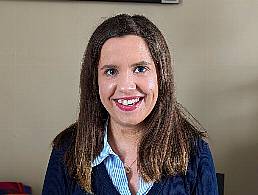In advance of International Women’s Day, Rebecca Whitworth of Red Hat discusses her career journey as a woman in computer science.
Rebecca Whitworth is an associate manager in Red Hat UK. She says that it’s a rewarding and interesting job, but it wasn’t easy for her to make the transition into that role after years of more technical work.
Here, she discusses her career journey from computing science to people management, and why mentors were critical to her development.
‘It has been a challenge to let go of the technical work I used to do to take up the role as manager’
– REBECCA WHITWORTH
What drew you to this career area?
I’ve been passionate about technology since childhood when we got our first computer and dial-up modem at home. I had an incredibly inspirational IT teacher in secondary school, who gave me confidence and drive, encouraging me to be ambitious and succeed in the subject.
From that point, I decided to pursue a BSc in computing science. It was a daunting prospect when I started my degree – I was one of just three young women in my year and I’d never programmed in the Java language we were using. In the first year, it was hard to get to know the other students, but by graduation I had made many lifelong friends.
The experience at university made me more resilient. It laid strong foundations for a career in technology.
What has been the hardest thing you’ve had to face in your career, and how did you overcome it?
By far the biggest challenge has been proving myself and making a great impression when meeting people. Unfortunately, there’s still a stigma around being a woman in the tech sector where, as a woman, you constantly feel like you have to demonstrate you know just as much as a male counterpart, if not more.
It’s motivated me to work even harder and fight the stereotypes that persist in the industry.
If you had the power to change anything within the STEM sector, what would that be?
The STEM sector needs to be more inclusive so that people of all backgrounds have long, successful and happy careers. Everyone should feel that they can be who they are and have equal opportunities to get to the top.
New technologies such as AI and machine learning will have a huge impact on the future for society and our planet, so it’s vital that the industry is as diverse as possible to ensure that we have a better chance of creating a more equal world.
To support this, more funding should be made available to help support minorities in STEM to contribute to the research and work being done.
Every company needs to be developing or expanding their own diversity and inclusion initiatives to ensure the creation of inclusive environments. At Red Hat, our culture is rooted in open source values, encouraging everyone to share their ideas. We believe that good ideas can come from anyone, anywhere, regardless of the job title or ranking in the hierarchy.
Diversity fuels our meritocratic culture by bringing in many perspectives and ideas, challenging our assumptions and inspiring innovation.
Just got the event pack for #IWD2020 #EachforEqual @RedHatUK 8th March don't forget! pic.twitter.com/EpjulsJREH
— Becky Whitworth (@becky_simmonds) February 6, 2020
We want everyone to feel comfortable contributing, so we take an open and inclusive approach to communicating, collaborating and making decisions. Our efforts to cultivate diversity and an inclusive environment go beyond our own company to reach open source communities and the broader technology industry.
Is there something in your personal life that has helped you in your job at Red Hat?
I’ve been very lucky to receive support from family and friends, who have given me the confidence to pursue my dreams.
My grandma is my role model as she fought tirelessly for greater equality in the places she worked. She inspired me to have drive and ambition and, most importantly, taught me that gender is not a flaw or something that should hold you back.
What’s the best thing about working in this area?
I have just moved into a role as a people manager and the best thing about it is helping to enable my team.
I work with some very talented people – supporting them to reach their goals is hugely satisfying. I also enjoy the freedom to carry on with technical work as well.
What’s the most exciting development you’ve witnessed in your sector since you started working in it?
Currently I work on enabling machine learning and artificial intelligence in business automation.
This is incredibly interesting, as it is a brand new initiative and I have the ability to drive the vision of the project.
Are there aspects of your job that you struggled to get to grips with?
It has been a challenge to let go of the technical work I used to do as an individual contributor to take up the role as manager.
However, the rewards from being a manager have helped to make the change.
Which of your personality traits makes you best suited to your job and this sector?
Empathy and organisational skills are really important skills to have in the IT industry.
It’s important to have a good mix of personal skills for the associates I manage as well as technical and organisational skills to keep up a technical role within the team too.
How do you make connections with others in the STEM community?
At Red Hat, we run different STEM initiatives aiming to excite young people about computer science.
For example, our Co.Lab groups introduce middle-school girls to principles of open source technologies, showing them how interesting working in IT can be. I am also part of a school event for children in the north-east [of the UK] called Bring it On.
If companies could take more of a leading role and help educate children and parents into STEM, it would help build a more inclusive future.
Has mentorship or coaching been important in your career?
Mentoring has been key to my development – there are some amazing role models within Red Hat. This has helped me to become a mentor for an internship this year, which has been very rewarding.
What advice would you give to someone thinking about a career in your area?
Do not be scared to go into this field. It can be daunting if you haven’t had the experience of programming before, but with hard work it is an easy skill to learn.
With the up-and-coming change into technology-driven projects it can help you to get into virtually any industry, so that you can do a bit of everything – for example, if you like art, a graphic design job gives you the best of both roles.




